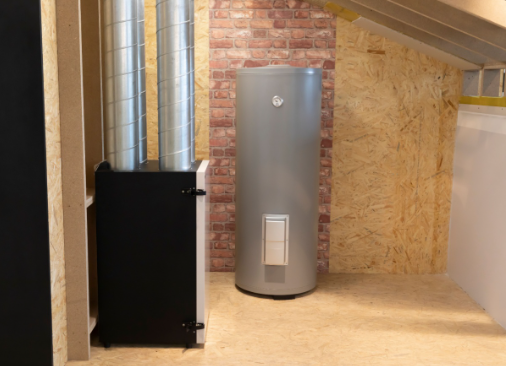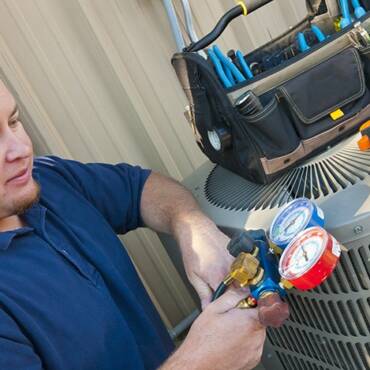Hot water is a necessity in our daily lives. But, as crucial as it is, there isn’t just one way to get it. When the time comes to choose a new water heater for your home, the decision often boils down to two options: tank or tankless. Each has its benefits, making the choice a little more complex than just grabbing the first option you see. So, how do you decide between a tankless vs. tank water heater?
In this blog, we’ll help you decide whether a tank or tankless water heater fits your household’s needs best.
Traditional Tank Water Heaters
Many homes still use traditional tank water heaters. These units store a set amount of water, typically between 30 to 50 gallons, in a tank that heats and maintains the water temperature throughout the day. So, when you turn on the hot water faucet, the already-heated water comes out instantly.
While this sounds convenient, it does have some downsides. Since the water is constantly heated — even when you’re not using it — this system can cause standby heat loss, meaning energy is used even when hot water isn’t needed. Plus, once the tank is emptied, you have to wait for it to refill and heat up again before you get more warm water.
Tankless Water Heaters
In contrast, tankless water heaters, also known as on-demand water heaters, only heat water when you need it. These systems use a high-powered burner or heating elements to instantly heat water as it passes through the unit. You get endless hot water without the need for a storage tank.
Because there’s no water sitting in a tank, you don’t waste energy keeping it warm, and tankless water heaters deliver hot water more efficiently. However, they often come with a higher initial cost, and the installation costs for a tankless water heater can be more expensive, especially if your home isn’t already set up for this type of system.
Pros and Cons: Tankless vs. Tank Water Heater
Choosing between a tank or tankless water heater depends on several factors, including your household’s water usage, your budget, and your home’s existing setup. Let’s break down the pros and cons of each option.
Pros of Tank Water Heaters
There are many reasons why homeowners still choose to install traditional storage tank water heaters. If you’re considering this option, let’s take a moment to review the potential benefits.
- Lower Initial Cost: One of the biggest advantages of a tank water heater is that it’s typically cheaper upfront. Storage tank models are generally more affordable to purchase and install, making them a go-to option for budget-conscious homeowners.
- Simplicity: Tank storage water heaters are widely considered to be straightforward and easier to install. Many homes are already equipped for a tank system, which means less hassle when replacing an old unit.
- Hot Water Storage: With a tank, you have stored hot water that’s ready to use. This is great for households with multiple showers running simultaneously.
Cons of Tank Water Heaters
There are potential downsides to consider when installing a storage water heater.
- Standby Heat Loss: As mentioned earlier, a storage tank water heater constantly heats water, whether you need it or not. This leads to higher energy costs over time.
- Limited Hot Water: Once you run through the stored water, you’ll have to wait for the tank to refill and reheat. This can be a problem during peak water usage times, like in the morning when everyone’s trying to get ready.
- Shorter Lifespan: Tank models typically last around ten to 15 years, which is shorter than their tankless counterparts.
Pros of Tankless Water Heaters
In the tankless vs. tank water heater debate, we also have to discuss the potential benefits of installing tankless heaters. Here are some benefits that make them an appealing option.
- Energy Efficiency: Tankless water heaters are incredibly energy efficient because they only heat water when you need it. This can translate into lower energy bills.
- Endless Hot Water: Since there’s no storage tank, a tankless system can provide an endless supply of hot water. This is perfect for large families or homes with heavy hot water usage.
- Longer Lifespan: Tankless units can last up to 20 years or more, making them a more durable option in the long run.
Cons of Tankless Water Heaters
In order to make an informed decision, you also need to be aware of the potential cons of tankless water heaters. Here is everything you need to know.
- Higher Initial Cost: One of the most noteworthy cons of tankless water heaters is the higher initial cost. While they can save you money in the long run, the upfront expense of installing a tankless water heater can be more than a tank system.
- Flow Rate Limitations: While tankless systems provide endless hot water, they may struggle to keep up with demand if multiple taps are running simultaneously. If you need to use hot water in a tank while doing laundry and taking a shower, you might experience a dip in temperature.
- Installation Complexity: Homes not already equipped for a tankless water heater installation might require significant upgrades, such as larger gas meters or new venting systems, adding to the overall cost.
How to Choose Between a Tank or Tankless Water Heater
Now that we’ve covered the basics of tank vs. tankless water heaters, you might be wondering how to choose between the two. Here are a few factors to keep in mind:
Household Hot Water Usage
The size of your family and how much hot water you use daily are critical factors in deciding between a tank or tankless water heater. If you have a large family that uses a lot of hot water throughout the day, a tank water heater might be a better choice, as it provides a consistent supply. On the other hand, if your household has lighter hot water demands, a tankless system could be more efficient.
Energy Efficiency
If energy savings are high on your priority list, tankless water heaters are the clear winner. By only heating water on demand, they reduce energy costs over time. However, don’t forget the higher initial cost and potential upgrades needed for installation.
Space Availability
If space is an issue in your home, the compact size of a tankless model may be ideal. Traditional water heaters take up a lot more space, so you’ll need to account for that in your utility room or basement.
Which Water Heater Is Right for You?
So, should you go with a tank or tankless water heater? The answer to this question largely depends on your household’s needs, budget, and long-term goals. For instance, if you value energy efficiency and want endless hot water, a tankless model could be a perfect fit. However, if you have high hot water usage or prefer a lower upfront cost, a traditional tank water heater might be the better choice.
When you’re ready to make a decision or need professional advice, turn to Service Plus. We can help you choose the right system for your home in Indianapolis, IN, or one of the nearby communities.
Install a New Water Heater With Service Plus
Choosing between a tankless vs. tank water heater is a big decision, but you don’t have to go it alone. At Service Plus, we’re proud to offer both tank and tankless water heater installation in Indianapolis, IN, and the surrounding areas. We’re here to answer your questions and can help you navigate your options.
Whether you’re interested in a tank water heater or a tankless model, we’re ready to provide you with reliable service. Contact our plumbers in Indianapolis today to schedule your installation!
Whether you require installation, repair, or maintenance, our technicians will assist you with top-quality service at any time of the day or night. Take comfort in knowing your indoor air quality is the best it can be with MOE heating & cooling services Ontario's solution for heating, air conditioning, and ventilation that’s cooler than the rest.
Contact us to schedule a visit. Our qualified team of technicians, are always ready to help you and guide you for heating and cooling issues. Weather you want to replace an old furnace or install a brand new air conditioner, we are here to help you. Our main office is at Kitchener but we can service most of Ontario's cities
Source link




Add Comment